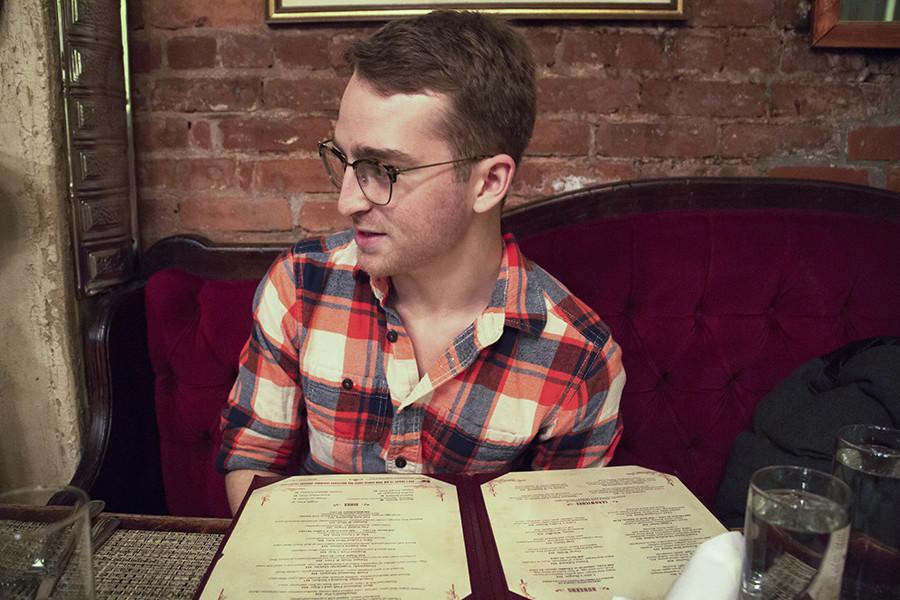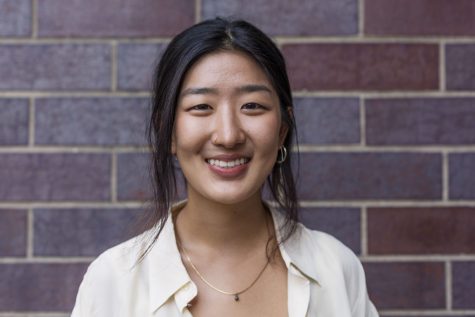Jake Rosenberg
Jake Rosenberg is an award winning playwright and one of the youngest authors of a work to have been accepted into the National Holocaust Theater Archive thanks to his most recent off-Broadway production in NYC, the self directed Muse of Fire.
March 12, 2015
Behind the massive, intricate doors of Lillie’s Irish pub, Jake Rosenberg sits in a booth with burgundy velvet seats surrounded by a collection of Victorian-era ornaments and types away on his laptop. He occasionally peers up to reread his ideas on the brightly lit screen, but is otherwise immersed in a world of dialogue, thoughts, characters and plot development.
For the playwright, a session at Lillie’s is a familiar routine.
“I write it and then rewrite it,” Rosenberg said. “When it’s done, I try to have a staged reading with an audience of people, I trust, and that’s usually pretty small, from 10 to 30 people and I really value their opinion. Then from there, I send it out.”
Although only a freshman at Tisch, Rosenberg has already written award-winning plays including “No One Gives a Clap” and “Big Ass Russian Novel,” which have been shown throughout the country, as well as in Germany and in Canada. Rosenberg said he was introduced to the playwriting after enrolling in a class during high school at the Jewish Community High School of the Bay in Marin County on a whim. The convenience and accessibility of the medium quickly drew Rosenberg in.
“You only need a couple of friends and an empty room to do it on its most basic level,” Rosenberg said.
Through his involvement in a closely knit Jewish community, Rosenberg realized that although the environment was very compassionate to its members, there was a conservative attitude toward the treatment of certain serious topics. In response to his frustration, Rosenberg developed his dramatic comedy, “Muse of Fire,” based on the history of the Holocaust.
“I think that if one thing is off-limits to talk about, then everything is off-limits,” Rosenberg said. “It sets a precedent for not being able to talk about and have an opinion on things — even if the conversation is ugly and heated, as long as the conversation is taking place, that’s the most important thing.”
For this play especially, Rosenberg devoted hours to rummaging through historical accounts on the Holocaust, until he came across a real-life story of two individuals that performed comedy in the concentration camps.
“I want to take history and the patterns that emerge within history and the characters and the very human stories in these complicated events and turn them into something that is accessible, something that is not a history textbook, something that is not a lecture, but something that makes you feel not just on an intellectual level but also on an emotional level,” Rosenberg said.
By the time he graduated high school, Rosenberg had made a name for himself in the local theater community in San Francisco. Rosenberg said much of his early success came from working with anyone willing to produce his plays and was grateful for anyone willing to devote their time into putting on something he had created.
“I have met some of the most interesting and exciting people that are doing the weirdest, wackiest things and it’s really cool because if I was holding out for a larger production, I would never get anywhere,” Rosenberg said. “I wouldn’t get to see my work, which is the most important thing — seeing it and learning from it and understanding what to do next time.”
Lauren Gunderson, a Tisch alumna and Rosenberg’s mentor, sees his dedication to continuously improve his plays as an indication of his potential to become a great playwright.
“I have found Jake to be smart and hungry,” Gunderson said. “He dreams big as a theater maker and follows through with his own muscle and wit. He’s curious not just about the art but about the business, which makes him not just a good writer, but a savvy writer.”
Rosenberg has also been involved in getting young people more interested in theater. He recently founded an app called Rusher, which provides rush tickets to Broadway shows to encourage more young people to go to these shows.
Rosenberg is now working at Stacey Mindich Productions, and on a few new plays including “Brothers.” Rosenberg believes that writing a couple pages a day on any subject can make a significant difference in producing work, especially for other aspiring playwrights.
“I don’t buy into the mentality that you can’t be original because everything’s been said so you can only build on something else,” Rosenberg said. “Just find the things that you’re super nerdy about, that you’re almost embarrassed for other people to know and just roll around in it.”
Back in the booth at Lillie’s, Rosenberg continues to work on what he describes as a passion: his struggle to create a balance of dialogue and art.
“The greatest playwrights go into detail about very complicated ideas and present them as a story and let the intellectual exercise be the most important part of the story rather than the popcorn entertainment quality,” Rosenberg said. “My goal is to marry the two of them together.” • Nina Jang
Video produced by Calvin Falk, Hark Kanwal, Shawn Paik,


























































































































































Daniel Bolter • Mar 12, 2015 at 2:16 pm
In the photo it looks like Jake is ordering food, not working on a play. So that was a little jarring.